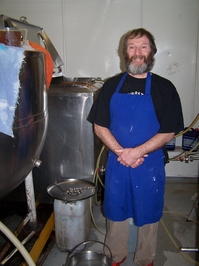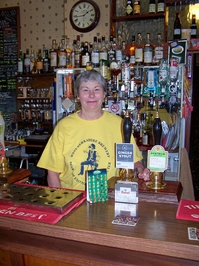The pub now standing at Platform One...
Added: Sunday, January 29th 2012
The pub now standing at Platform One is the Prince of Wales in Foxfield. The remote Cumbrian inn is a few steps from the station on the Barrow to Carlisle line. Most people who leave trains at Foxfield have one aim in mind -- to cross the road and get into the pub to discover which beers Stuart Johnson is brewing that week.
The station is a request stop. Passengers have to ask the conductor to stop at Foxfield, a request that brings a knowing tap on the side of the nose and the crisp comment: "Ah, you're going to the Prince." Going to the Prince has become a trek for legions of beer lovers keen to sample the unique beers and the equally unique atmosphere in the pub. It's been run since 1996 by Lyndia and Stuart Johnson and they have built a reputation for a beer policy that most publicans would consider bizarre, along with simple but generous food and excellent accommodation.
The beer policy can best be described as "whatever Stuart feels like brewing." The only regular beer on the bar is his Dark Mild, testimony to the fact that the style is popular in an area that includes Workington, which once had heavy industry and thirsty workers. That beer aside, the other pumps on the bar will serve whatever Stuart has mashed, boiled and fermented in his four-barrel plant above the bars.
"We like to challenge drinkers with our beers," Lynda Johnson says. She's far more than just "front of house". She shares Stuart's love of good beer and has steeped herself in beer styles to such an extent that she gives lectures to CAMRA -- Campaign for Real Ale -- meetings. The Prince of Wales has six handpumps and the Johnsons sell beers from other micro-breweries as well as their own brews. The only beer you won't find in the pub is lager: if Ersatzenbrau is your tipple, stay on the train.
Lynda was a teacher who discovered beer in a legendary ale house, the Dun Cow in Durham. In 1980, when she met Stuart, a self-employed electrician, she found they shared the same dream: to run a pub with its own brewery. Stuart was inpsired to make his own beer by the biggest-selling cask ale of its time, Draught Bass. He brewed at home and then moved to a greenhouse in Wakefield that eventually became the Tiger Tops pub. The Johnsons have kept an interest in Tiger Tops but brewing is now carried out there by Barry Smith.
Lynda's teaching work took her to Cumbria. Stuart was driving through the area one day and saw a "For Sale" sign outside the Prince of Wales. The asking price was £82,500. He toured the pub, saw there was room for a small brewery, and with Lynda's support beat the price down to £66,000.
The pub gave Stuart free rein to brew whatever took his fancy. It may seem an odd business model but it's worked. Over the ensuing years the Johnsons have built a national reputation for their beer and regular events that include "dark beer" only weekends, stout, porter and wheat beer weeks, and cider and perry festivals. The Johnsons need to attract customers from outside the area. Foxfield has just 27 houses. The locals are "good drinkers", accoding to Lynda, but visitors are a vital lifeline "though cows on the track can be a disaster". Steam trains occasionally run on the line and that attracts an additional audience of steam buffs. The Johnsons cut beer prices to the bone to compensate for the high cost of train travel. Mild costs £2.20 a pint, stronger beers 10 pence more.
Lynda Johnson says the takings from beer alone makes the pub's profitability marginal. The pub is closed on Mondays and Tuesdays and no food is served on Wednesdays but the rest of the week Lynda and her small band of assistants produce made-to-order pasties, filled Yorkshire puddings and sandwiches. A Prince of Wales pasty will keep most people going for a day or two.
"We had to offer food as people sometimes have to wait several hours for a return train," she explains. Bring Your Own Curry nights are an added attraction "but we're not seen as a food pub," she adds. But food plays a role in Stuart Johnson's brewing policy. He brews "breakfast beers", adding left-over cereals from the dining room. The backbone of all his beers is Maris Otter, considered to be the finest malting barley. He uses a vast range of hops, including English Goldings and Northdown, Styrian Goldings from Slovenia and "lots of New Zealand hops": New Zealand is the world's major producer of organic varieties.
"Nobody else brews different beers every week," he says. "I'm not looking for consistency." The bers available when I dropped in included a Light Ale, brewed with just pale Maris Otter malt, Fleur de Lys brewed with pale and crystal malts and soft brown suagr, and two wheat beers, Kig Rat and King Horn, made with 60% wheat alongside barley malt.
Stuart disappeared into the pub cellar and returned with a sample of a new 4.3% stout, brewed with pale, black and crystal malts, flaked barley and muscavado sugar. The hops were Goldings and Northdown. The beer was superb, packed with coffee and bitter chocolate flavours. But don't rush -- it probably won't be on in a week or two.
Stuart Johnson's passion for beer is underscored by his research into styles and recipes. He produced a large, dog-eared, leather-bound volume that contains recipes in copperplate writing for mild and porter devised by London brewers in the 18th and 19th centuries. They inspire many of the dark beers he brews for the pub.
Pleasantly full of giant pasty, dark mild and stout, I followed the Johnsons on a tour of the pub that took in the spacious, comfortable and warm downstairs bars, Stuart's tiny, cramped brewery, where it would be difficult to swing the proverbial tabby, and the well-appointed, en suite letting rooms. The Prince of Wales is a pub worth missing a few trains for. It would be good to book in for a few days, watch the trains chuff by to Barrow and sample the beery delights Stuart concocts in his box of tricks on the first floor above the pub.
*The Prince of Wales was built in 1850 before the railway arrived but in anticipation of the line from Carlisle to Barrow. It was originally owned by the Kirkstanton Brewery and over the following years passed to the Lion Brewery, famous for its John Peel beers, then Matthew Brown, which was taken over and closed by Scottish & Newcastle. It became a free house in 1978 and was bought by the Johnsons in 1996. Today it offers not only good beer, food and accommodation but also fascinating railway memorabilia. In 2011 Lynda and Stuart Johnson were named among CAMRA's top 40 campaigners to mark the movement's 40th anniversary.
First published in the Publican's Morning Advertiser.







